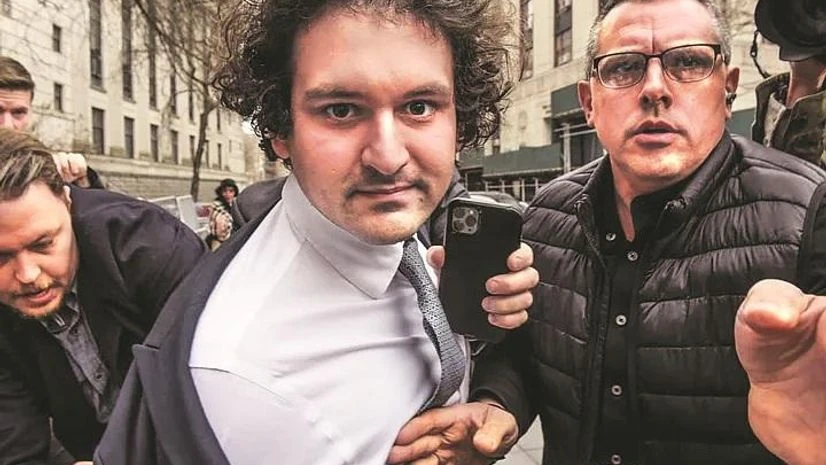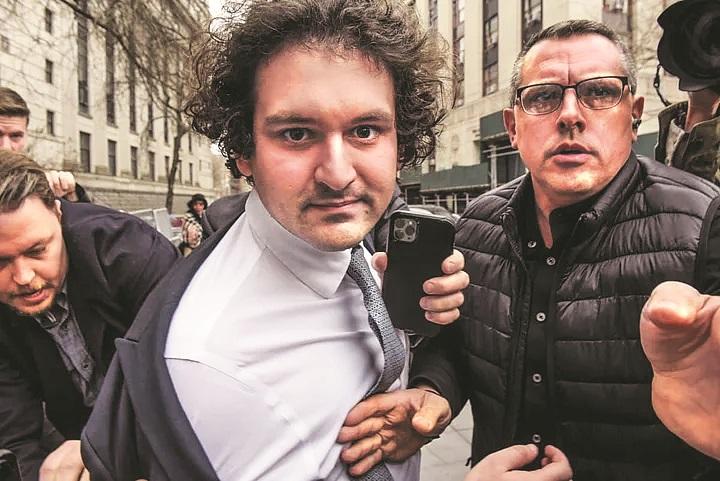)
Citing the advisory guidelines, Bankman-Fried’s lawyers said a “just sentence” would be a prison term in the range of 63 months to 78 months
By Chris Dolmetsch and Robert Burnson
FTX co-founder Sam Bankman-Fried should serve no more than 6 1/2 years in prison for orchestrating the fraud that brought down the cryptocurrency exchange, his lawyers told a federal judge who could issue a sentence of as long as 20 years for the most serious charges.
Attorneys for the 31-year-old former crypto mogul made their recommendation to US District Judge Lewis A. Kaplan in a 98-page memo late Tuesday ahead of his March 28 sentencing. The filing includes letters from Bankman-Fried’s supporters, including his parents and public health advocates from Africa attesting to his charity work.
Under federal sentencing guidelines that take into account “Sam’s charitable works and demonstrated commitment to others, a sentence that returns Sam promptly to a productive role in society would be sufficient, but not greater than necessary, to comply with the purposes of sentencing,” according to the memo.
Citing the advisory guidelines, Bankman-Fried’s lawyers said a “just sentence” would be a prison term in the range of 63 months to 78 months.
FTX Bankruptcy
His lawyers also recommended that he not be ordered to pay restitution or forfeit any assets, saying none of the accounts identified for possible forfeiture were for Bankman-Fried’s personal benefit. They argued that customers and creditors will receive a return of their funds through FTX’s bankruptcy.
Bankman-Fried was convicted in November of charges including wire fraud and conspiracy following a two-month trial. Kaplan’s final decision on sentencing could be a guidepost for other crypto currency executives who mismanaged funds.
Prosecutors have until March 15 to file their response to the memo.
US probation officials recommended a sentence of 100 years, Bankman-Fried’s lawyers said in the memo, calling the proposal “grotesque” and “barbaric” and arguing that it’s based on a flawed assumption that his offenses involved a loss of $10 billion.
Bankman-Fried last month hired Marc Mukasey, a former federal prosecutor and experienced white-collar defense attorney, replacing the lawyers who represented him at trial. Mukasey, who has a history of representing white-collar defendants, late last year secured a four-year sentence for Nikola Corp. founder Trevor Milton, well below the 11 years sought by prosecutors, in the same court where Bankman-Fried is being sentenced.
Autism Expert
Letters from psychiatrists, including an autism expert, were included in Tuesday’s filing. While Bankman-Fried has not previously disclosed an autism diagnosis, his ADHD became an issue at trial. His lawyers repeatedly complained about Bankman-Fried’s struggle to access medication while in custody.
His father, Joseph Bankman, alluded to mental health issues in a letter to the judge.
“Sam has struggled throughout his life to learn and control things most of us take for granted, such as eye contact, small talk, and responding to social cues,” Bankman wrote.
The FTX co-founder’s father urged Kaplan not to impose a “draconian sentence” that would likely lead to placement in a high- or medium-security prison.
“Such a setting would put Sam in an environment where his responses to social cues will sometimes be seen as odd, inappropriate and disrespectful; when that happens, he will be in significant physical danger,” Bankman wrote. “Nothing he has done can justify putting him at that risk.”
Bankman-Fried’s sentence is unlikely to match some of the largest punishments handed down to white-collar criminals, such as Sholam Weiss, who received 845 years in prison in 2000 for racketeering and fraud linked to the collapse of National Heritage Life Insurance Co. His sentence was later commuted by President Donald Trump. Bernie Madoff died in prison while serving a 150-year term for his $20 billion Ponzi scheme.
His lawyers said the most comparable case is that of Michael Milken, the so-called “junk bond king” who was convicted of securities fraud in the 1980s and banned from the securities industry but remade himself into a philanthropist. Milken, who was pardoned by Trump in 2020, was released from custody at a young age and went on to become “a tremendous force for good,” Bankman-Fried’s lawyers said.
“Sam’s ascendance to an influential position in the financial world at such a young age, using cryptocurrency, a new financial product, mirrors the young Milken’s meteoric rise,” Bankman-Fried’s attorneys said in their memo. “The genius of both men is undeniable, their contributions were vast, their wealth and fame were unplanned, their means and methods were questioned by prosecutors, and their downfall was swift and tragic.”
Kevin O’Brien, a former federal prosecutor, said Milken’s case provides hope to Bankman-Fried.
“Someone that young and that obviously talented who has so much to contribute potentially, I don’t think Kaplan’s gonna kill him, I really don’t,” said O’Brien, who’s now a defense lawyer. “He might even give him something under 20 years.”
You can’t always get what you want | What notable white-collar defendants requested at sentencing compared with the initial prison term issued by trial judge.
Kaplan — who was appointed to the bench in 1994 by President Bill Clinton — will determine the ultimate punishment using federal sentencing guidelines, which take into account the seriousness of the offenses, the defendant’s criminal history, as well as the amount of the losses.
Kaplan in the past has argued for caution when it comes to the guidelines, saying during the May 2022 sentencing of a man who pleaded guilty to a Ponzi-like cryptocurrency scheme that the loss often plays a “disproportionate role” in determining the punishment.
Rocky Relationship
But Bankman-Fried’s rocky relationship with Kaplan won’t necessarily help the one-time crypto mogul. He has been testing the judge for more than a year, from insisting the identities of his bail guarantors remain a secret to leaking the diary notes of his ex-girlfriend — a key government witness — to the press. The latter issue led Kaplan to revoke Bankman-Fried’s bail weeks before the trial was scheduled to start. Bankman-Fried has been in a federal jail in Brooklyn since August.
The trial itself featured another setback for Bankman-Fried following an uncommon proceeding. The judge limited what Bankman-Fried’s team could tell jurors about advice he got from lawyers, but not before putting the former FTX chief executive officer on the stand for three hours, outside the presence of the jury, to preview his testimony.
The case is US v Bankman-Fried, 22-cr-673, US District Court, Southern District of New York.
Note:- (Not all news on the site expresses the point of view of the site, but we transmit this news automatically and translate it through programmatic technology on the site and not from a human editor. The content is auto-generated from a syndicated feed.))



